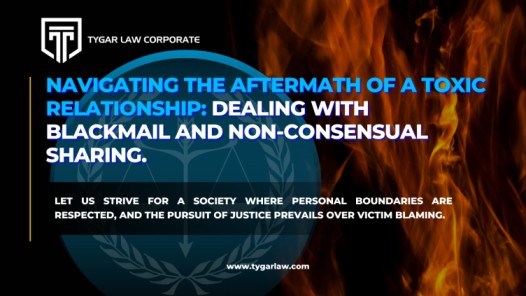Navigating the Aftermath of a Toxic Relationship: Dealing with Blackmail and Non-consensual Sharing
Escaping a toxic relationship, you're now faced with a new challenge. Your ex is using compromising photos to manipulate you, aiming to cause emotional distress or exert control.
This behaviour is not just morally wrong but also illegal, with the potential imprisonment of up to seven years in India.
Here, we'll explore actions to take if you're caught in this situation and the legal consequences for those behind these actions.
- Unravelling Revenge Porn: Understanding the Concept: Revenge porn, an insidious form of non-consensual pornography, involves the distribution of explicit sexual content featuring an individual without their consent. These images may have been taken with or without the victim's knowledge. The motive behind such acts is often to inflict emotional distress or damage the individual's reputation.
- Navigating the Maze: How Should a Victim Respond: India lacks a specific law against revenge porn, but victims can still seek help under the Information Technology Act. If you're a victim, file a complaint with the cyber cell in person or online. Concerning consent for photos/videos, taking them with mutual agreement isn't illegal. Sharing them without permission is an offence.
- Unmasking the Culprit: Consequences for the Offender: It's important to note that offenders are not limited to a specific gender. Non-consensual pornography affects individuals irrespective of their gender, leading to the establishment of gender-neutral laws against such acts.
- Violation of Privacy: Legal Ramifications: Privacy, a fundamental right under Article 21 of the Indian Constitution, receives specific protection under Section 66E of the Information Technology Act. This provision addresses the offence of violating an individual's privacy by transmitting or publishing explicit images, carrying a potential prison term of three years or a fine.
- Sharing Without Consent: Legal Consequences: The act of capturing private images during intimate moments is, in itself, a criminal act. Section 354C of the IPC (Voyeurism) states that capturing or watching a woman engaged in a private activity without her knowledge leads to imprisonment.
Furthermore, Section 67A of the IT Act penalizes the publication or transmission of sexually explicit content with imprisonment and fines.
Conclusion: A Resolute End
While revenge porn lacks a standalone legal definition, its components fall under various offences that can be prosecuted. In a society like India, where discussions about intimate relationships remain taboo, it's vital to raise awareness about the legal consequences of revenge porn. This crime affects individuals of all genders, and both perpetrators and victims can face legal repercussions.
Let us strive for a society where personal boundaries are respected, and the pursuit of justice prevails over victim blaming.

